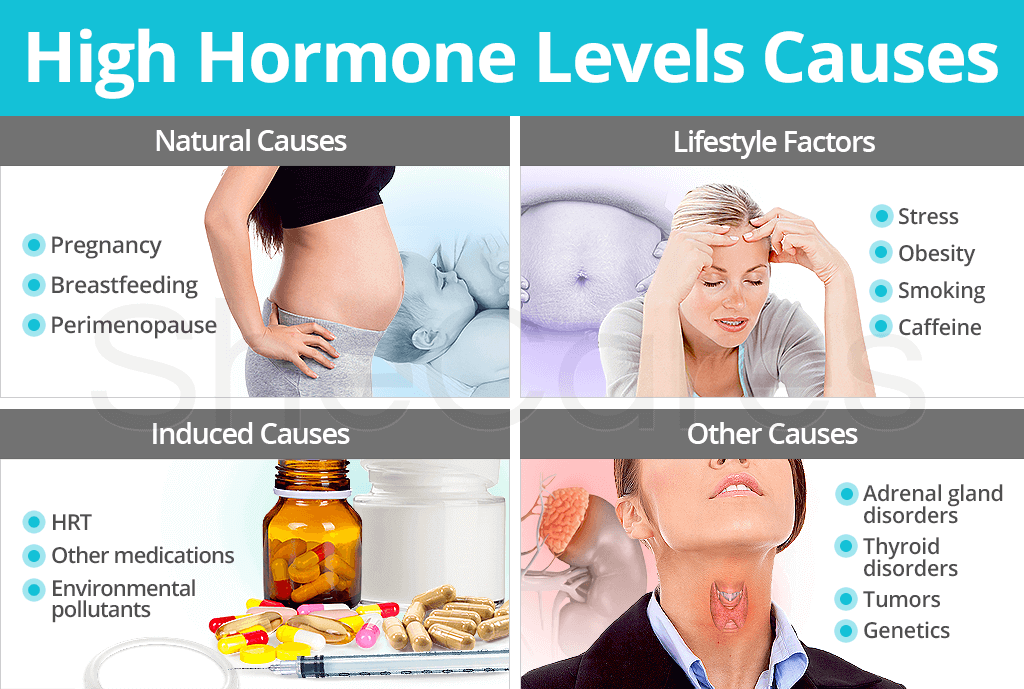Indulging in overall hormonal equilibrium starts with being able to identify the underlying factor throwing bodily functions out of balance. As such, possible natural causes, lifestyle factors, induced causes, and others are important to take into consideration. Find out the causes of high hormone levels in women so that you can be on your way to living a symptom-free life.
Natural Causes of High Hormone Levels
During Adulthood
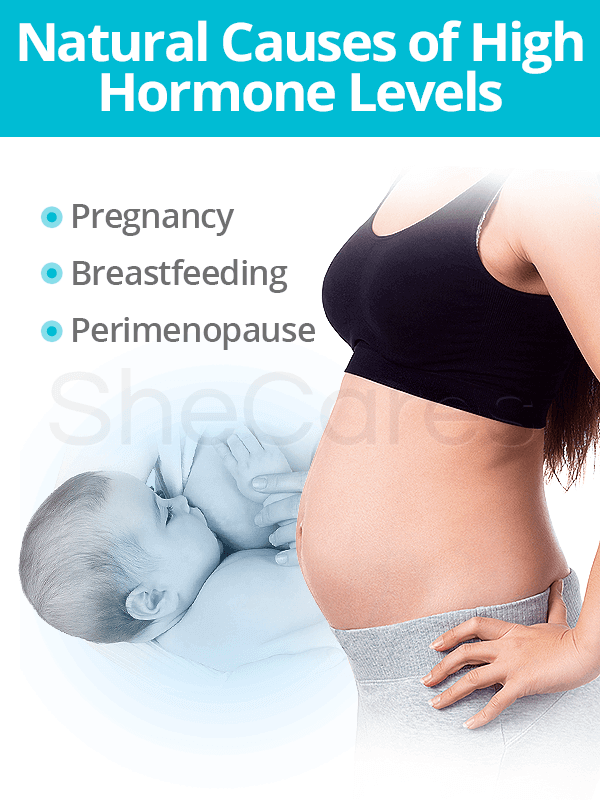
Abnormal spikes in hormone levels during menstruating years can occur when a woman is pregnant, in labor, and breastfeeding.
During pregnancy, reproductive and pregnancy hormones are naturally higher than normally to encourage proper fetal development throughout the various stages of gestation; support the growth and development of mammary tissues; start labor contractions; and more.
Then, after birth, these levels spike to allow and maintain breast milk production; promote feelings of alertness and euphoria; strengthen the mother-infant bond; foster women's caretaking behaviors; and more functions.
During Perimenopause and After Menopause (40s on up)
As women are exiting their fertile years with the initiation of perimenopause, hormonal imbalance is bound to happen as the ovarian reserve becomes depleted.
Lasting an average of four years, the menopause transition is characterized by drastic hormonal fluctuations that trigger various physical and psychological symptoms.1
Because ovarian eggs are the main producer of the hormone progesterone, when they run out, high estrogen levels or even estrogen dominance can occur as the hormone goes unopposed.
Lifestyle Factors that Cause High Hormone Levels
Other than aforementioned natural causes of high hormone levels, there are various lifestyle factors that can make your hormones high, including:
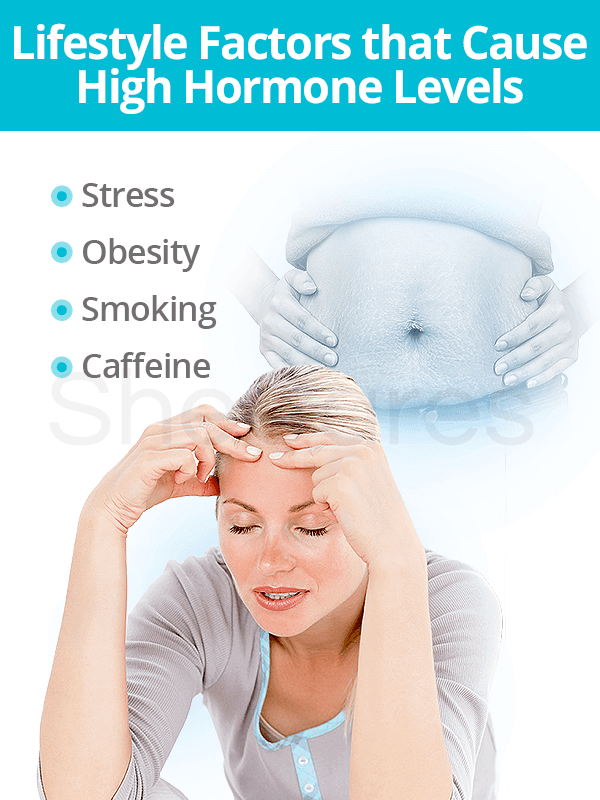
- Stress. Chronic stress causes elevated cortisol and has been scientifically connected to dehydroepiandrosterone (DHEA) levels, among others.2,3
- Obesity. Fat cells produce hormones, such as leptin, estrogens, and testosterone. As a matter of fact, studies have found that those who are obese tend to have higher estrogen and testosterone levels than those of normal weight.4
- Smoking. Smoking can stimulate adrenal activity, thus increasing adrenal androgen levels. This has been seen mainly among postmenopausal smokers. Smoking has also shown to increase estrogen levels during the first half of the menstrual cycle.5
- Caffeine. Moderate caffeine consumption (more than 200 mg daily) was associated with higher estrogen levels in Asian women, and caffeinated soda and green tea (more than 240 mL) intake is linked to higher estrogen levels among white and Asian women.6
- Alcohol. Urinary estrogen levels have been found to rise by up to a third in pre- and postmenopausal women who drink more than 30 g of daily alcohol.7
Induced Causes of High Hormone Levels
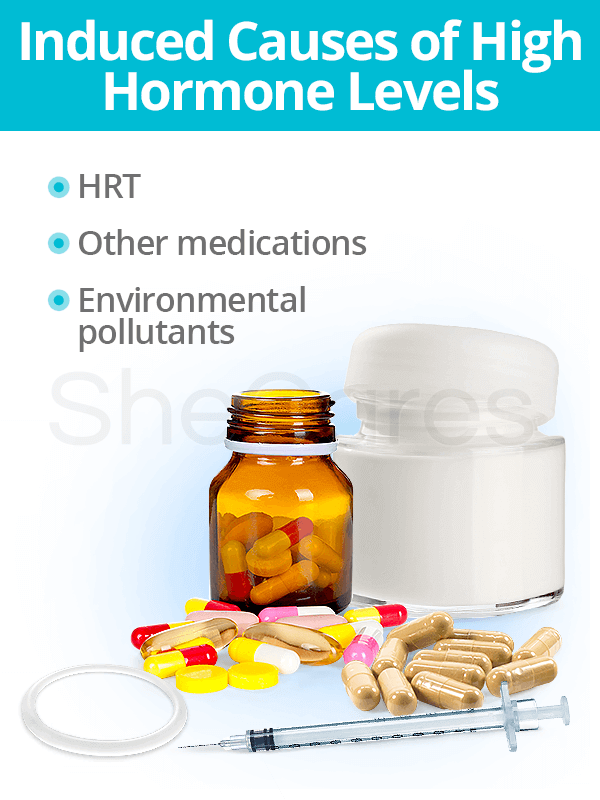
There are numerous procedures and treatments that can be reasons for high hormone levels in women, including, but not limited to:
- Hormone replacement therapy (HRT) is commonly implemented to increase low hormone levels in women who are passing through menopause. If levels are not monitored close enough during treatments, they could become disproportionately elevated.
- Other medications can lead to elevated hormone levels, such as oral corticosteroid medications to treat inflammatory diseases or birth control pills.
- Environmental pollutants - commonly found in plastics and cosmetics - can throw off hormonal balance, inducing high levels. For instance, the man-made bisphenol A (BPA) and butyl benzyl phthalate (BBP) have been found to have estrogenic effects.8
Other Causes of High Hormone Levels
Additional causes of high hormone levels can consist of:
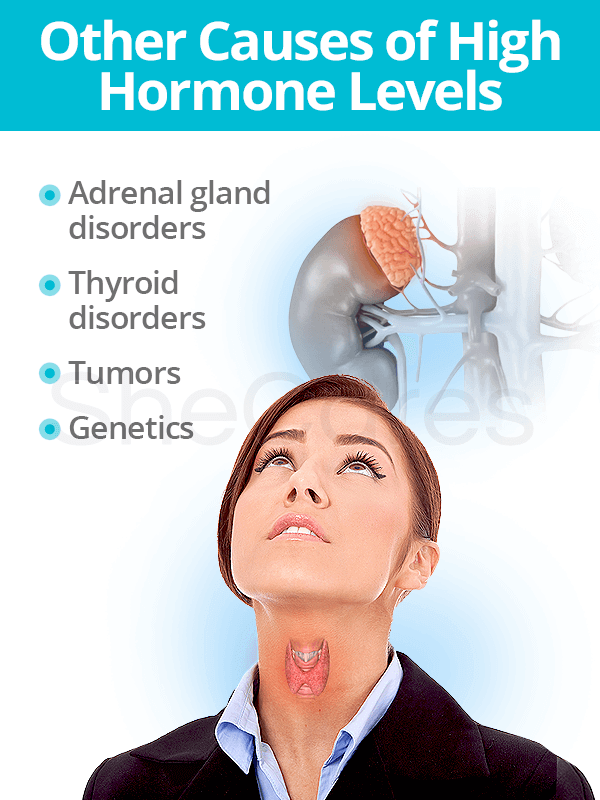
- Adrenal gland disorders. Disorders of the adrenal glands, such as noncancerous tumors, can cause hormone levels to be high, such as cortisol.
- Thyroid disorders. Thyroid disorders - such as an underactive thyroid (hypothyroidism) - can cause high prolactin as well as high thyroid stimulating hormone (TSH) levels, among other disturbances.
- Pituitary gland conditions. Tumors, inflammation, or even surgery of the pituitary gland can cause it to produce excess hormones, leading to conditions like prolactinoma or Cushing syndrome.
- Tumors. Tumors present in the other essential organs - lungs, pancreas, thymus gland, etc. - can secrete excess levels of cortisol.
- Genetics. When it comes to high hormone conditions, like polycystic ovary syndrome (PCOS), researchers are convinced of genetics playing an integral role in their development.
All in all, what causes high hormone levels in females can range from natural causes to lifestyle factors to induced motives, and more.
If you suspect elevated hormone levels to be the cause of poor health, check out high hormone levels symptoms. Hormonal equilibrium for a healthier you is just a click away!
Sources
- Eunice Kenney Shriver National Institute of Child Health and Human Development. (2017). What causes PCOS? Retrieved December 16, 2019, from https://www.nichd.nih.gov/health/topics/pcos/conditioninfo/causes
- Mayo Clinic. (2019). Cushing syndrome: Symptoms & causes | Prolactinoma: Symptoms & causes. Retrieved December 16, 2019, from https://www.mayoclinic.org/diseases-conditions/cushing-syndrome/symptoms-causes/syc-20351310 | https://www.mayoclinic.org/diseases-conditions/prolactinoma/symptoms-causes/syc-20376958
- National Partnership for Women & Families. (n.d.). The Role of Hormones in Childbirth. Retrieved December 16, 2019, from http://www.childbirthconnection.org/maternity-care/role-of-hormones/
- The North American Menopause Society. (n.d.). Changes in Hormone Levels. Retrieved December 16, 2019, from https://www.menopause.org/for-women/sexual-health-menopause-online/changes-at-midlife/changes-in-hormone-levels
- Sidhu, S. et al. (2017). Endocrine Changes in Obesity. Retrieved December 16, 2019, from https://www.ncbi.nlm.nih.gov/books/NBK279053/
- Women in Balance Institute: National University of National Medicine. (n.d.). Do You Have a Hormone Imbalance? Retrieved December 16, 2019, from https://womeninbalance.org/seventh-woman/do-you-have-a-hormone-imbalance/
- World Health Organization. (2009). Session 2: The physiological basis of breastfeeding. Retrieved December 16, 2019, from https://www.ncbi.nlm.nih.gov/books/NBK148970/
Footnotes:
- Cleveland Clinic. (2019). Menopause, Perimenopause and Postmenopause. Retrieved December 16, 2019, from https://my.clevelandclinic.org/health/diseases/15224-menopause-perimenopause-and-postmenopause
- Maninger, N. et al. (2010). Acute and chronic stress increase DHEAS concentrations in rhesus monkeys. Psychoneuroendocrinology, 35(7), 1055-1062. doi: 10.1016/j.psyneuen.2010.01.006
- Qiao, S. et al. (2017). Hair Measurements of Cortisol, DHEA, and DHEA to Cortisol Ratio as Biomarkers of Chronic Stress among People Living with HIV in China: Known-Group Validation. PLOS One, 12(1), e0169827. doi: 10.1371/journal.pone.0169827
- Breastcancer.org. (n.d.). Hormone Levels Drop When Obese Women Lose Weight. Retrieved December 16, 2019, from https://www.breastcancer.org/research-news/20120530
- Windham, G.C. et al. (2005). Cigarette Smoking and Effects on Hormone Function in Premenopausal Women. Environmental Health Perspectives, 113(10), 1285-1290. doi: 10.1289/ehp.7899
- Schliep, K.C. et al. (2012). Caffeinated beverage intake and reproductive hormones among premenopausal women in the BioCycle Study. The American Journal of Clinical Nutrition, 95(2), 488-497. Doi: 10.3945/ajcn.111.021287
- Gill, J. (2000). The Effects of Moderate Alcohol Consumption on Female Hormone Levels And Reproductive Function. Alcohol and Alcoholism, 35(5), 417-423. doi: 10.1093/alcalc/35.5.417
- Fernandez, S.V. & Russo, J. (2010). Estrogen and Xenoestrogens in Breast Cancer. Toxicologic Pathology, 38(1), 110-122. doi: 10.1177/0192623309354108
